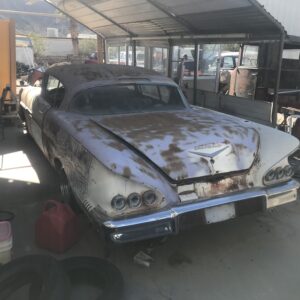
The following segment from Wikipedia provides a great deal of background information about th 1958 Impala — a highly prized version of the Chevrolet Impala series.
Two door Impalas are considered both rare and desirable, lending an air of limited accessibility to the mix and bringing collectors to the table for the additional value these beautiful cars entail.
andFirst generation (1958)[edit]
| First generation | |
|---|---|

1958 Chevrolet Bel Air Impala Sport Coupe
|
|
| Overview | |
| Model years | 1958 |
| Assembly |
List
|
| Designer | Joseph R. Schemansky[11] |
| Body and chassis | |
| Body style |
|
| Layout | FR layout |
| Platform | GM B platform |
| Related | 1958 Chevrolet Delray 1958 Chevrolet Biscayne 1958 Chevrolet Bel Air 1958 Chevrolet Yeoman 1958 Chevrolet Brookwood 1958 Chevrolet Nomad |
| Powertrain | |
| Engine | 235 cu in (3.9 L) Blue Flame I6 283 cu in (4.6 L) Turbo Fire V8 348 cu in (5.7 L) W-series Turbo Thrust V8 |
| Transmission | 3-speed manual 3-speed overdrive manual 2-speed Powerglide automatic 3-speed Turboglide automatic |
| Dimensions | |
| Wheelbase | 2985 mm (117.5 in) |
| Length | 5310 mm (209.1 in)[12] |
| Width | 1975 mm (77.7 in) |
| Height | 1450 mm (57 in)[12] |
For 1958, GM was promoting its 50th year of production, and introduced anniversary models for each brand; Cadillac, Buick, Oldsmobile, Pontiac, and Chevrolet.[13] The 1958 models shared a common appearance on the top models for each brand; Cadillac Eldorado Seville, Buick Limited Riviera, Oldsmobile Starfire 98, Pontiac Bonneville Catalina, and the Chevrolet Bel-Air Impala.
The Impala was introduced for the 1958 model year as a top-of-the-line Bel Air in 2-door hardtops and convertibles. From the windshield (A) pillar rearward, the 1958 Bel Air Impala differed structurally from the lower-priced Chevrolet models. Hardtops had a slightly shorter greenhouse and longer rear deck. The wheelbase of the Impala was longer than the lower-priced models, although the overall length was identical. Interiors held a two-spoke steering wheel and color-keyed door panels with brushed aluminum trim. No other series included a convertible.
The 1958 Chevrolet models were longer, lower, and wider than their predecessors.[14] The 1958 model year was the first with dual headlamps. The tailfins of the 1957 were replaced by deeply sculptured rear fenders. Impalas had three taillights each side, while lesser models had two and wagons just one. The Impalas included crossed-flag insignias above the side moldings, as well as bright rocker moldings and dummy rear-fender scoops.
The standard perimeter-type frame was abandoned, replaced by a unit with rails laid out in the form of an elongated “X”. Chevrolet claimed that the new frame offered increased torsional rigidity[12] and allowed for a lower placement of the passenger compartment. This was a transitional step between traditional construction and the later fully unitized body/chassis; the body structure was also strengthened in the rocker panels and firewall.[15] However, this frame was not as effective in protecting the interior structure in a side-impact crash as a traditional perimeter frame.
A coil spring suspension replaced the previous year’s rear leaf springs, and an air-ride system was optional.
A 283 cu in (4,640 cc) engine was the standard V8, with ratings of 185 hp (138 kW), 230 hp (170 kW), and 250 hp (190 kW) with optional Rochester Ramjet fuel injection. Two versions of Chevrolet’s 348 cu in (5,700 cc) V8, its first big-block, were also optional, producing 250 hp (190 kW) with a single four-barrel carburetor and 280 hp (210 kW) with three two-barrels.[16]
In total, 55,989 Impala convertibles and 125,480 coupes were built representing 15% of Chevrolet production. The 1958 Chevrolet Bel Air Impala helped Chevrolet regain the number-one production spot in this recession year.[9]
